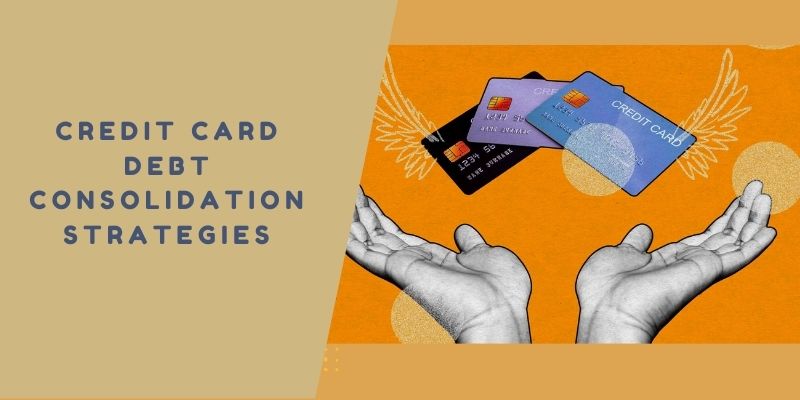Credit cards are a great way to accumulate benefits like cash back or travel miles. They act as a source of cash in times of need and can aid in establishing credit to pave the road for future purchases like a home or automobile.
But occasionally, things happen in life, and before you know it, you’re saddled with several credit cards, each with a different balance. It can be difficult to plan and carry out a strategy to pay off these obligations, but it is possible.
The most effective plan will vary from person to person given the variety of ways to consolidate and pay off these debts. Today, seao.infowill look at some Credit card debt consolidation strategies.
What Is a Credit card debt consolidation strategies?
Credit card debt consolidation strategies are obtained when a new loan is obtained to settle your previous debts. Let’s assume you have three credit cards with balances of $1,000 each to keep things simple. With a consolidation loan, you would take out a $3,000 loan, pay off your three $1,000 credit card balances, and now have just one $3,000 loan.
How Does Credit Card Consolidation Work?
The procedure of Credit card debt consolidation strategies is typically simple. You collect all of the debts you wish to combine into one payment, either working with a loan officer, a credit counselor, or on your own. From there, a plan or loan is established so that you can pay your monthly installment to a single site, making it simpler for you to remember your due date and, ideally, resulting in a reduced overall APR.
Let’s discuss various consolidation techniques that you might be able to use in light of this. This is by no means a comprehensive list, but it may provide you with some concepts you hadn’t previously thought of.
5 Credit card debt consolidation strategies

1. Balance transfer card
Pros:
- introductory APR of zero percent.
- For debt repayment without interest, a year or longer.
Cons:
- To qualify, you must have good to outstanding credit.
- often charges a fee for balance transfers.
- After the introductory period, a higher APR takes effect.
This choice, also known as credit card refinancing, transfers credit card debt to a balance transfer credit card that doesn’t charge interest for a limited time, typically 12 to 21 months. Most balance transfer cards require strong to excellent credit (690 credit score or better).
A good balance transfer card won’t have an annual fee, however many issuers impose a one-time cost of 3% to 5% of the transferred amount for balance transfers. Consider whether the interest you will save over time will be enough to offset the fee before selecting a card.
2. Credit card consolidation loan

Pros:
- Fixed interest rates provide a constant monthly payment.
- Low APRs for credit scores of 650 and higher.
- Some lenders offer direct payments to creditors.
Cons:
- With poor credit, finding a low rate is challenging.
- An origination fee may apply to some loans.
- Membership in a credit union is necessary to apply.
Consolidating credit card debt or other types of debt is possible with an unsecured personal loan from a bank, credit union, or internet lender. The loan should provide you with a lower APR on your debt.
Although this service is less prevalent among banks and credit unions, the majority of internet lenders allow you to pre-qualify for a credit card consolidation loan without having an impact on your credit score. You can obtain an idea of the rate, loan amount, and duration you might receive by pre-qualifying.
Uncertain whether a personal loan is the best option? To enter all of your bills in one location, view typical interest rates from lenders, and determine savings, use our debt consolidation calculator.
3. Home equity loan or line of credit

Pros:
- Interest rates for personal loans are typically cheaper.
- You might be able to qualify with poor credit.
- Long repayment term maintains cheaper payments.
Cons:
- To qualify, you typically need a home appraisal and equity in your house.
- Your home serves as the security, which you could lose if you default.
If you own a property, you might be able to borrow money or open a credit line against the equity and use it to pay off credit card debt or other bills Credit card debt consolidation strategies
A line of credit functions like a credit card and has a variable interest rate, but a home equity loan is a lump-sum loan with a set interest rate.
During the draw period, which is typically the first 10 years, a HELOC frequently requires interest-only payments. That implies that you’ll have to pay more than the required minimum payment each month to lower the principle and minimize your overall debt throughout that time.
4. 401(k) loan
Pros:
- Compared to unsecured loans, lower interest rates.
- Your credit score won’t be affected.
Cons:
- Your retirement money may be impacted.
- If you can’t repay, there are severe penalties and costs.
- You might need to fast repay your debt if you quit or lose your work.
It’s not suggested to accept a loan from a 401(k) plan or other employer-sponsored retirement account because doing so could negatively affect your retirement.
Just after you’ve ruled out Credit card debt consolidation strategies, should you give it some thought.
One advantage is that your credit score won’t be affected because this loan won’t appear on your credit report. But there are substantial disadvantages: If you can’t pay back, you’ll suffer a large penalty plus taxes on the outstanding balance, and you can end up in deeper debt.
5. Debt management plan
Pros:
- monthly installments that are set.
- may halve your interest rate.
- does not lower your credit rating.
Cons:
- Monthly fees and startup fees are typical.
- Your loan repayment period could last three to five years.
Plans for managing debt combine numerous debt payments into a single one each month with a lower interest rate. It works best for people who are having a hard time making ends meet due to credit card debt but are ineligible for other options because to a low credit score.
Credit card debt consolidation strategies management don’t impact your credit score, in contrast to certain alternatives for Credit card debt consolidation strategies. Bankruptcy can be a better choice if your debt exceeds 40% of your income and cannot be paid off within five years.


